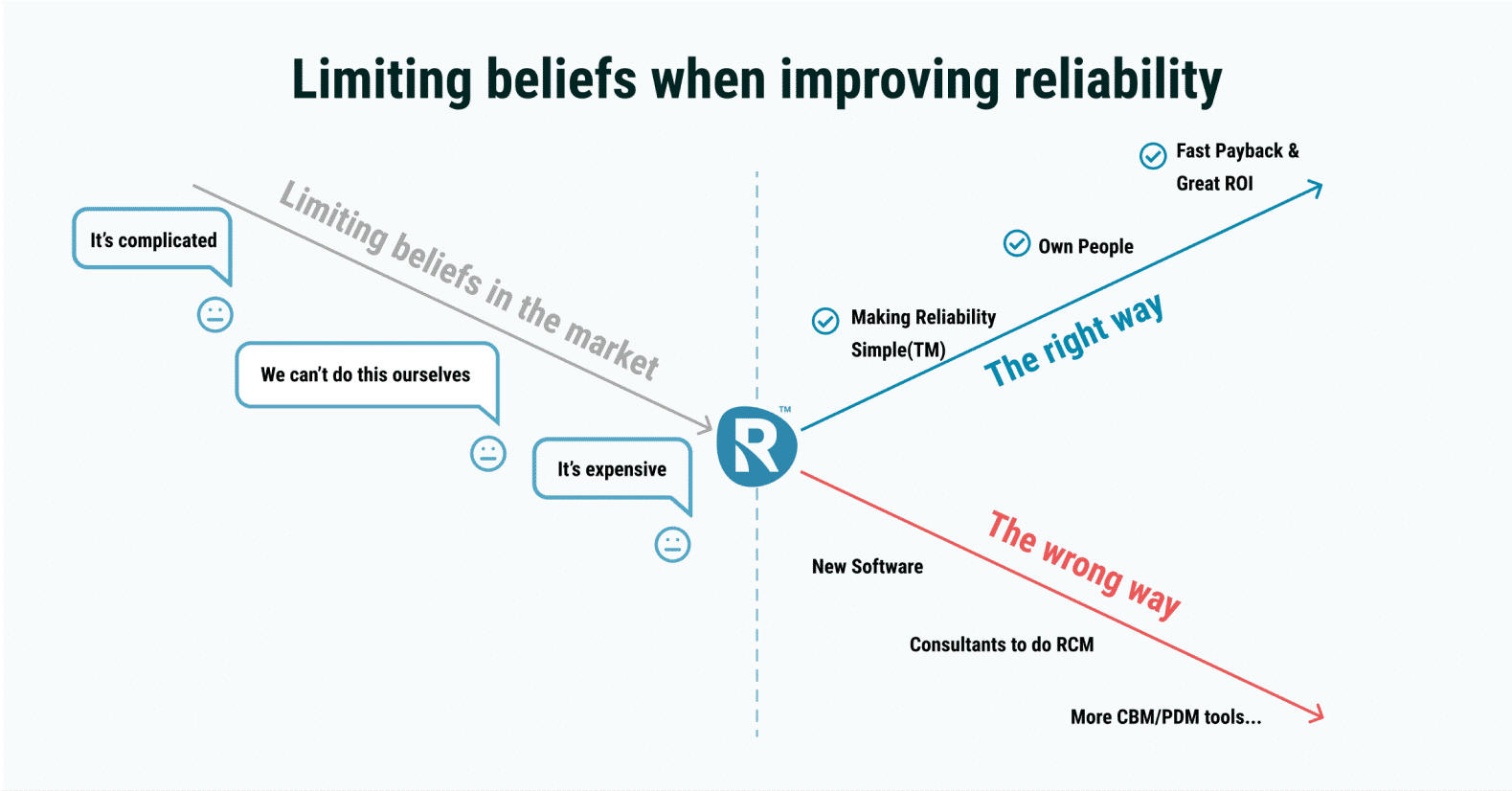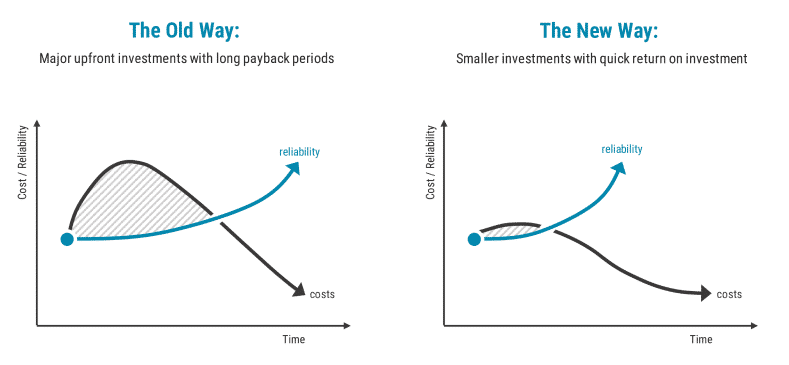Our Approach

Tackling limiting beliefs
Our approach as a business is based on tackling a number limiting beliefs that are all too common in industry when it comes to improving reliability. These limiting beliefs are that:
(1) Improving reliability is complicated
(2) That you can’t improve reliability without a lot of external help
(3) Improving reliability expensive and requires a lot of upfront investment
These limiting beliefs drive organisations down the wrong track when it comes to improving reliability:
Our approach
We aim to get our clients away from these wrong approaches, which are typically centred around buying expensive new software, hiring consultants to conduct in-depth reliability centred maintenance (RCM) studies, and investing (more) in Condition-Based Maintenance (CBM) and Predictive Maintenance (PDM) tools and technologies.
Experience has shown these approaches do not work unless the basics are addressed.
Instead, our approach is there centred on helping our clients improve reliability by:
- Making Reliability Simple™
- Delivering easy-to-understand knowledge to our clients complete with proven implementation frameworks so you can implement it all with your own team
- Making your reliability improvements pay for themselves quickly. In fact, some of the improvements we recommend are often the best investments your business will make.
Making Reliability Simple™
As you can see from our Road to Reliability™ framework we have made reliability simple again. Nothing complex. Just 4 Essential Elements. Easy to understand.
Those 4 Essential Elements, once implemented and effective, will give you a huge increase in reliability. And from there you can look at implementing more advances solutions and practices if that’s justified in your business.
You can do it yourself
Across industry we rely heavily on consultants. And for good reasons. Consultants bring experience, expertise, and often much needed horsepower. Unfortunately, good consultants don’t come cheap so implementing your reliability improvements by relying largely on consultants is an expensive approach.
And an approach that often fails, because all too often the implementation lacks in change management and does not address the organisation’s capability to sustain the improvements that have been made. Once the consultants leave, the improvements unravel.
Instead, train your team in how the process should work. Explain to them why things need to be done in a certain way. Provide them the tools and frameworks they need to implement the changes themselves. Coach them where required and the change will be sustainable.
And yes a lack of manpower is a common problem. Yet at the same time, we see a lot of organisations that say they struggle with manpower, but they also have a lot of untapped talent. Find that talent in your organisation. Train them. Unleash them.
Fast payback and great ROI
For a long time, reliability improvement was done through big programs. A significant upfront investment which was then followed by a multi-year improvement program. Payback was long and returns were always conveniently in the distant future.
That is a hard sell, especially in an organisation that has lived with low reliability and a reactive maintenance for a long time.
An approach that is easier to sell (and therefore easier to implement) is one that consists of a series of smaller, more focussed improvements, with much smaller upfront investments and quick returns on that investment.
And that’s exactly how we encourage our clients to implement their Road to Reliability™ journey.
What not to do
When I talk to people about their strategy for making their plant more reliable, I get a whole list of things they’re either working on, or a long list of what they’re planning.
Unfortunately, many of those things won’t work.
Some decide to invest in a new CMMS. Shiny new software with amazing mobility features and all ready for Industry 4.0. Implementing a new CMMS is a lot of work and expensive.
So to keep costs down most companies don’t bring across historical data. Most companies don’t fix the gaps in their asset data and simply move across an incomplete list of equipment. Most companies only train their employees in CMMS transactions, not the underlying business processes. Most companies train but don’t follow up with sustained coaching.
And so most companies don’t get the value out of their new CMMS that they should. And then they blame the software.
Others kick off a major RCM project with the first phase dedicated to a detailed Criticality Analysis – because that is what was recommended by the consultant. Two months later having done lots of workshops and having spent a lot of money there is a beautiful thick report. It sure looks impressive.
But management is frustrated – they’ve spent a ton of money and see no return on their investment. Reliability hasn’t improved. Workload hasn’t been reduced. No value. Participants are frustrated as the workshops were long-drawn affairs with lots of detailed discussions, but 2 months later nothing has changed. There is just a lot more workshops still to be done. The person leading the charge isn’t feeling great either has their reputation has taken a hit. And now the reputation of RCM – one of the most powerful tools we have at our disposal – has once again tarnished because it wasn’t deployed at the right time, in the right way.
Plenty of others decide that to improve their plant reliability they’ll hop on the bandwagon of new, better, more technology. Extra sensors. Wireless sensors. Advanced condition monitoring tools. State-of-the-art software systems.
Everything is put in place to identify the early onset of failure. But all too often the organisation itself is not ready to deal with the early onset of failure, to deal with weak signals. All too often, the organisation is in the midst of a reactive maintenance cycle, and all those early warnings are lost in the noise and chaos of the firefighting.
None of these ‘improvements’ come cheap. Yet rarely do these efforts move the needle when it comes to long-term plant reliability. There is no real return for the money put in.
No wonder that few leaders want to invest in maintenance or reliability improvement. They’ve been stung too many times.
And sadly, many plant managers continue to see maintenance as a bottomless money pit, as a necessary evil. And reliability as just something miraculous that doesn’t happen in their plant.
We need to fix that perception by adopting a more simple, more practical, more results-oriented approach. And that’s our mission:
Our mission
At Road to Reliability™ we train and coach our customers to create more reliable, more profitable, and safer plants using a simple, proven framework.
Reliable Plants are a better place to work, are more sustainable, less wasteful, and can be a force for good in their local communities.
Our vision
We see a future where together with our customers we have created thousands of Reliable Plants around the world using the Road to Reliability™ Framework.
R2 Reliability Pty Ltd is the first company to train its customers in both fundamental maintenance & reliability processes as well as how to effectively implement these processes in their organisation using their own staff – without consultants.
With our blended online learning solutions, we offer cost-effective, efficient knowledge acquisition combined with proven implementation methods and tools. And we will do so in our client’s language, online and on-demand, through our web-based academy as well as our own branded mobile app.
The Road to Reliability™ Framework is not just a method to improve reliability, it is the most cost-effective and most sustainable approach to do this.
A simple truth
Planning & scheduling
Preventive maintenance
and defect elimination

